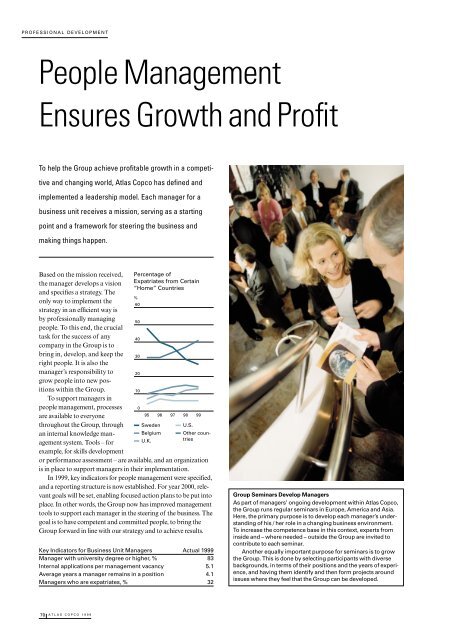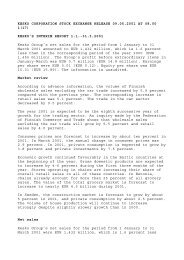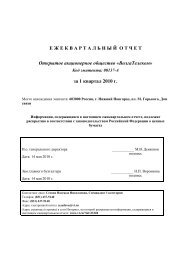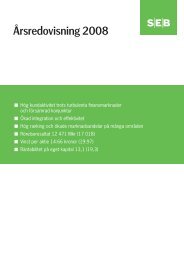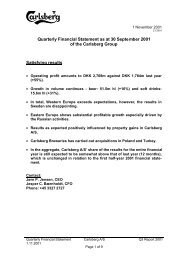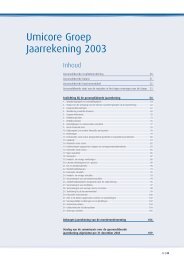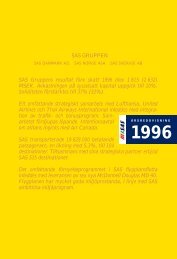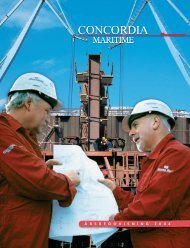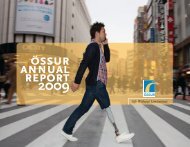Atlas Copco - Annual Report 1999
Atlas Copco - Annual Report 1999
Atlas Copco - Annual Report 1999
You also want an ePaper? Increase the reach of your titles
YUMPU automatically turns print PDFs into web optimized ePapers that Google loves.
PROFESSIONAL DEVELOPMENT<br />
People Management<br />
Ensures Growth and Profit<br />
To help the Group achieve profitable growth in a competi-<br />
tive and changing world, <strong>Atlas</strong> <strong>Copco</strong> has defined and<br />
implemented a leadership model. Each manager for a<br />
business unit receives a mission, serving as a starting<br />
point and a framework for steering the business and<br />
making things happen.<br />
Based on the mission received,<br />
the manager develops a vision<br />
and specifies a strategy. The<br />
only way to implement the<br />
strategy in an efficient way is<br />
by professionally managing<br />
people. To this end, the crucial<br />
task for the success of any<br />
company in the Group is to<br />
bring in, develop, and keep the<br />
right people. It is also the<br />
manager’s responsibility to<br />
grow people into new positions<br />
within the Group.<br />
To support managers in<br />
people management, processes<br />
are available to everyone<br />
throughout the Group, through<br />
an internal knowledge management<br />
system. Tools – for<br />
example, for skills development<br />
or performance assessment – are available, and an organization<br />
is in place to support managers in their implementation.<br />
In <strong>1999</strong>, key indicators for people management were specified,<br />
and a reporting structure is now established. For year 2000, relevant<br />
goals will be set, enabling focused action plans to be put into<br />
place. In other words, the Group now has improved management<br />
tools to support each manager in the steering of the business. The<br />
goal is to have competent and committed people, to bring the<br />
Group forward in line with our strategy and to achieve results.<br />
Key Indicators for Business Unit Managers Actual <strong>1999</strong><br />
Manager with university degree or higher, % 83<br />
Internal applications per management vacancy 5.1<br />
Average years a manager remains in a position 4.1<br />
Managers who are expatriates, % 32<br />
70 ATLAS COPCO <strong>1999</strong><br />
Percentage of<br />
Expatriates from Certain<br />
“Home” Countries<br />
%<br />
60<br />
50<br />
40<br />
30<br />
20<br />
10<br />
0<br />
95<br />
96<br />
Sweden<br />
Belgium<br />
U.K.<br />
97<br />
98<br />
99<br />
U.S.<br />
Other countries<br />
Group Seminars Develop Managers<br />
As part of managers’ ongoing development within <strong>Atlas</strong> <strong>Copco</strong>,<br />
the Group runs regular seminars in Europe, America and Asia.<br />
Here, the primary purpose is to develop each manager’s understanding<br />
of his / her role in a changing business environment.<br />
To increase the competence base in this context, experts from<br />
inside and – where needed – outside the Group are invited to<br />
contribute to each seminar.<br />
Another equally important purpose for seminars is to grow<br />
the Group. This is done by selecting participants with diverse<br />
backgrounds, in terms of their positions and the years of experience,<br />
and having them identify and then form projects around<br />
issues where they feel that the Group can be developed.


